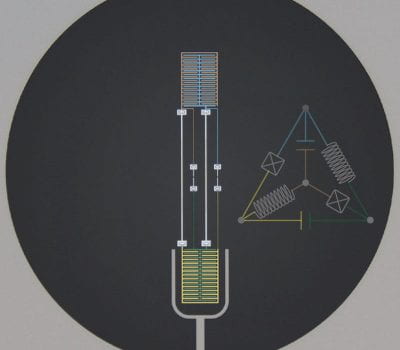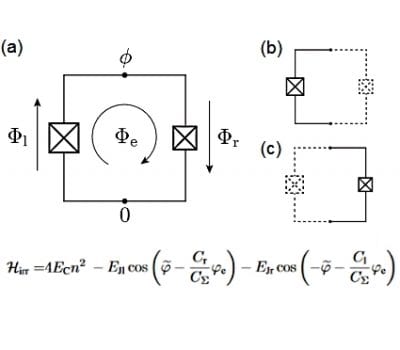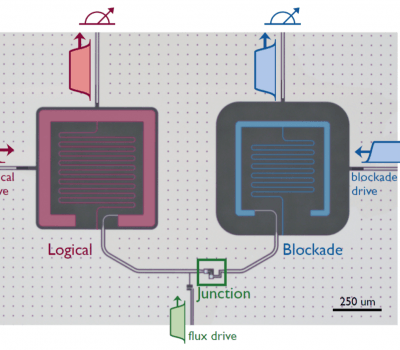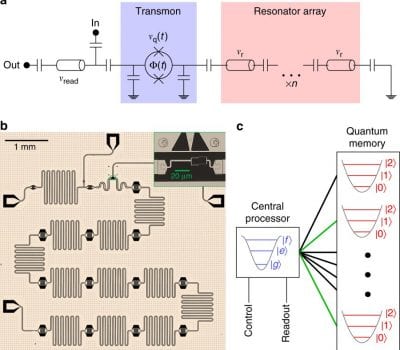Superconducting circuits extensively rely on the Josephson junction as a nonlinear electronic element for manipulating quantum information and mediating photon interactions. Despite continuing efforts in pushing the coherence of Josephson circuits, the best photon lifetimes have been demonstrated in microwave cavities. Nevertheless, architectures based on quantum memories require a qubit element for logical operations at […]
Uncategorized
New arxiv preprint: Experimental realization of an intrinsically error-protected superconducting qubit
Encoding a qubit in logical quantum states with wavefunctions characterized by disjoint support and robust energies can offer simultaneous protection against relaxation and pure dephasing. Using a circuit-quantum-electrodynamics architecture, we experimentally realize a superconducting 0−π qubit, which hosts protected states suitable for quantum-information processing. Multi-tone spectroscopy measurements reveal the energy level structure of the system, […]
New PRB paper: Circuit quantization in the presence of time-dependent external flux
Circuit quantization links a physical circuit to its corresponding quantum Hamiltonian. The standard quantization procedure generally assumes any external magnetic flux to be static. Time dependence naturally arises, however, when flux is modulated or when flux noise is considered. In this case, application of the existing quantization procedure can lead to inconsistencies. To resolve these, […]
New Publication: Gradient-based optimal control of open quantum systems using quantum trajectories and automatic differentiation
In a new PRA manuscript, we present a gradient-based optimal-control technique for open quantum systems that utilizes quantum trajectories to simulate the quantum dynamics during optimization. Using trajectories allows for optimizing open systems with less computational cost than the regular density matrix approaches in most realistic optimization problems. We introduce an improved-sampling algorithm which minimizes […]
Recent New Journal of Physics Publication: Control and coherence time enhancement of the 0–π qubit
In a new collaboration with the Université de Sherbrooke, we have shown that the coherence times of a realistic 0–π device can surpass that of today’s best superconducting qubits (Groszkowski et al 2018 New J. Phys. 20 043053). Here we address controllability of the 0–π qubit. Specifically, we investigate the potential for dispersive control and […]
New preprint: Gradient-based optimal control of open quantum systems using quantum trajectories and automatic differentiation
In a recent arXiv preprint, we present a gradient-based optimal-control technique for open quantum systems that utilizes quantum trajectories to simulate the quantum dynamics during optimization. Using trajectories allows for optimizing open systems with less computational cost than the regular density matrix approaches in most realistic optimization problems. We introduce an improved-sampling algorithm which minimizes […]
New PRA publication: Adaptive rotating-wave approximation for driven open quantum systems
In a new PRA paper, We present a numerical method to approximate the long-time asymptotic solution to the Lindblad master equation for an open quantum system under the influence of an external drive. The proposed scheme uses perturbation theory to rank individual drive terms according to their dynamical relevance and adaptively determines an effective Hamiltonian. […]
New preprint: Quantum control of an oscillator using stimulated nonlinearity
In a new arXiv preprint, we collaborate with Andrew A. Houck’s research group at Princeton University on quantum control of an oscillator using stimulated nonlinearity. Superconducting circuits extensively rely on the Josephson junction as a nonlinear electronic element for manipulating quantum information and mediating photon interactions. Despite continuing efforts in designing anharmonic Josephson circuits with […]
New PRA publication: Universal stabilization of single-qubit states using a tunable coupler
In a new PRA paper, we theoretically analyze a scheme for fast stabilization of arbitrary qubit states with high fidelities, extending a protocol recently demonstrated experimentally. Our scheme utilized red and blue sideband transitions in a system composed of a fluxonium qubit, a low-Q LC-oscillator, and a coupler enabling us to tune the interaction between […]
New Nat. Commun. publication: Random access quantum information processors using multimode circuit quantum electrodynamics
Qubit connectivity is an important property of a quantum processor, with an ideal processor having random access—the ability of arbitrary qubit pairs to interact directly. This a challenge with superconducting circuits, as state-of-the-art architectures rely on only nearest-neighbor coupling. Here, we implement a random access superconducting quantum information processor, demonstrating universal operations on a nine-qubit […]








